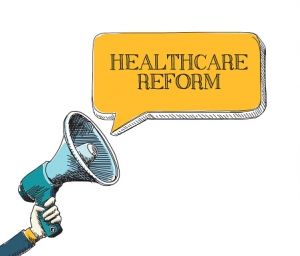Employers
What happens to beneficiaries who are enrolled in COBRA when a merger or acquisition occurs?
The Internal Revenue Service (IRS) has some rather thorough and complex guidelines that address COBRA issues when business reorganizations occur, including mergers and acquisitions. In an effort to simplify an otherwise complex situation, we can generally break down the guidance as follows:
Posted April 25th, 2016 in Producers, Employers, Individuals
The President of the United States can have a significant impact on the shape and direction of health care, as has been seen with President Obama and the passage of the Affordable Care Act (ACA). The American people will cast their vote for the next President of the United States on November 8, 2016. The future of the health care industry will largely be influenced by the outcome of the election. Here is a very high level summary on how the presidential candidates have suggested they would change the health care industry:
Donald Trump
The Health Insurance Portability and Accountability Act (HIPAA) establishes national standards for the privacy and security of protected health information (PHI). HIPAA initially only applied to covered entities, which consist of health plans, health care providers and health care clearinghouses. In 2009, HIPAA was expanded by the Health Information Technology for Economic and Clinical Health Act (HITECH).
Originally posted on January 2, 2015 and updated on April 10, 2015, June 19, 2015 and April 11, 2016.
Posted April 4th, 2016 in Producers, Employers, Individuals
H&R Block®, the largest tax services provider in the country, has indicated that so far this year the average penalty paid by those individuals without health insurance in 2015 is $383. The average penalty paid in 2014 was $172, reflecting an increase of $211 from the previous year. The penalties will be steeper in 2016 being the greater of $695 or 2.5% of income.
Whether it be the ACA, COBRA, ERISA, HIPAA, Section 125, or another regulation, employers can find themselves out of compliance somehow, and they may not even be aware. Here is a list of some common areas of non-compliance, not ranked in any particular order.
Posted March 18th, 2016 in Producers, Employers, Individuals
We can categorize health insurance plans in a number of different ways. There are fully-insured and self-insured plans, HMOs and PPOs, high deductibles and low deductibles, and metallic tiers (bronze, silver, gold and platinum) which are used in some market segments. There’s also one other way to categorize health insurance plans, and that’s by their “grandparent” status. The grandparent status determines which Affordable Care Act (ACA) rules a health insurance plan must comply with.
Grandfathered Plans
Posted March 11th, 2016 in Producers, Employers, Individuals
Each year the Department of Health and Human Services (HHS) issues a set of rules referred to as the “Notice of Benefit and Payment Parameters.” This set of rules generally addresses changes and new requirements that apply to certain provisions of the Affordable Care Act (ACA).
Posted February 26th, 2016 in Producers, Employers, Individuals
The Centers for Medicare and Medicaid Services (CMS) recently announced a new process that will impact anyone seeking to enroll with a special enrollment period (SEP) on the Healthcare.gov website. Under the current process, individuals who experience a qualifying event simply need to check a box on the application to be eligible for an SEP.










